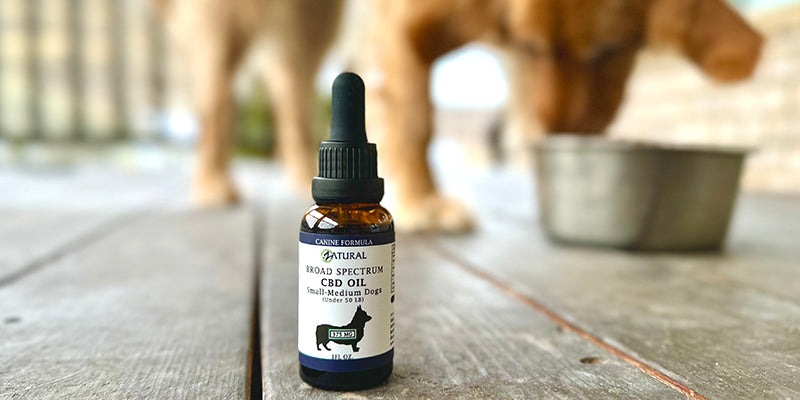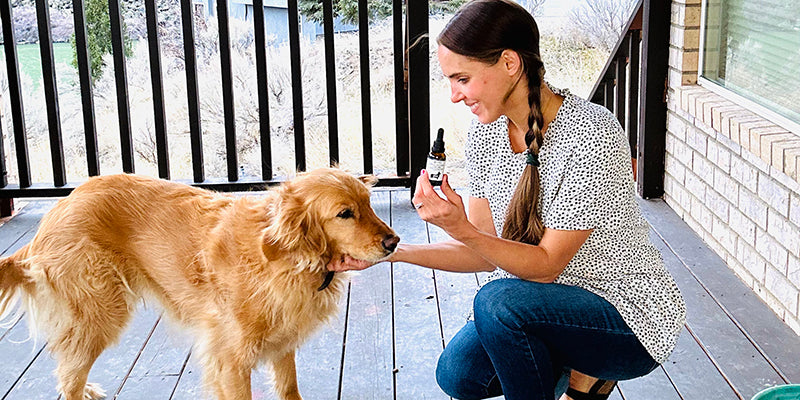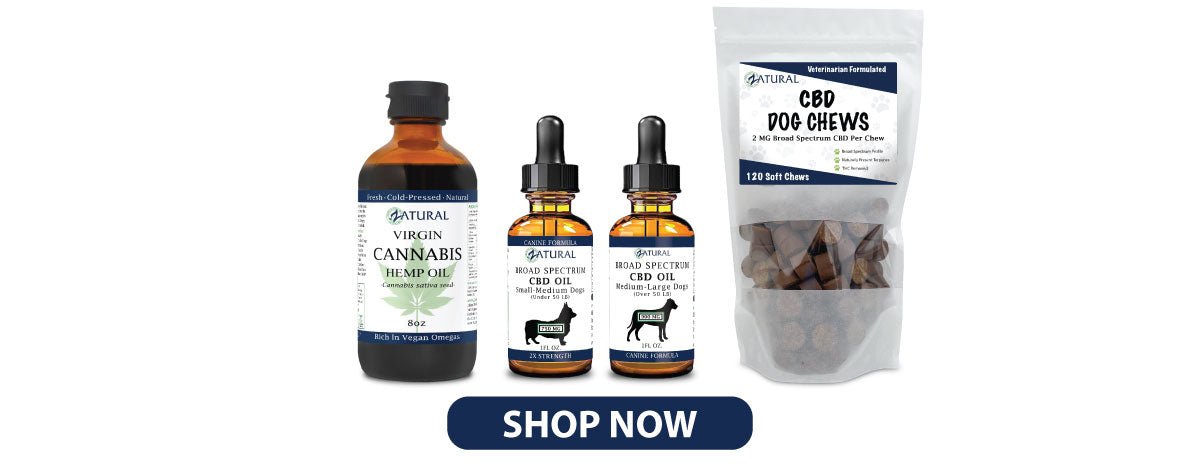In a world increasingly inclined towards natural remedies and holistic well-being, it's no surprise that our furry friends also benefit from these trends. As pet owners, we want the best for our beloved companions, including exploring natural options for their health and wellness.
One such natural remedy that has gained significant attention is hemp seed oil, a product that has shown promise in enhancing the well-being of our canine companions. This blog will uncover hemp seed oil's potential benefits and safety considerations for dogs.
Whether you're a seasoned pet enthusiast or new to the world of pet wellness, this guide aims to provide you with a comprehensive understanding of hemp seed oil's role in canine health. So, let's explore the possibilities and shed light on the natural advantages hemp seed oil may offer our four-legged friends.
Understanding the potential hemp oil benefits for dogs can help pet owners decide whether hemp seed oil is a safe and supportive addition to their dog’s wellness routine.
Understanding Hemp Seed Oil
Hemp seed oil, often referred to simply as hemp oil, is a natural oil extracted from the seeds of the hemp plant. It's important to note that this oil is distinct from other hemp-derived products like CBD oil or hemp extract. Hemp seed oil has been used for centuries for its nutritional value and potential health benefits.
Nutritional Benefits of Hemp Seed Oil
One of the standout features of hemp seed oil is its rich nutrient profile. It's packed with omega-3 and omega-6 fatty acids in an ideal ratio for overall health. These essential fatty acids are crucial in maintaining healthy dogs' skin, coats, and joints.
Additionally, hemp seed oil contains vitamins like vitamin E, an antioxidant that supports immune function. It's also a source of minerals such as phosphorus, potassium, sodium, magnesium, sulfur, calcium, iron, and zinc, contributing to your dog's well-being.
Hemp Oil vs. Other Types of Hemp Products
It's essential to distinguish hemp seed oil from other hemp-derived products like CBD oil or hemp extract. Unlike CBD oil, which is extracted from the leaves, flowers, and stalks of the hemp plant and may contain varying levels of cannabinoids like CBD and trace amounts of THC, the hemp seed oil is derived solely from the seeds of the hemp plant and contains little to no cannabinoids.
This means hemp seed oil does not have the psychoactive properties associated with THC and does not induce a "high" in dogs or humans. Understanding this difference is vital when exploring hemp seed oil's potential benefits and uses for dogs.
Hemp Seed Oil and Dogs
Dogs, like humans, have an endocannabinoid system (ECS) that plays a crucial role in maintaining balance and overall well-being. The ECS consists of receptors, endocannabinoids produced by the body, and enzymes that break down these compounds. It regulates various physiological processes, including mood, appetite, sleep, and immune function.

Potential Benefits of Hemp Seed Oil for Dogs
Does Hemp help dogs with potential benefits? It does, due to its rich nutrient profile. These benefits include:
- Support for Skin and Coat Health: The omega-3 and omega-6 fatty acids in hemp seed oil can promote healthy skin and a glossy coat in dogs. These essential fatty acids help reduce inflammation and combat skin conditions like dryness and itching.
- Joint Health: Omega fatty acids in hemp seed oil may relieve dogs with joint pain. They have anti-inflammatory properties that can help reduce discomfort and promote joint flexibility. These omega fatty acids are known for their anti inflammatory properties, which may help dogs experiencing joint pain or stiffness associated with aging or activity.
- Immune System Support: Vitamins and minerals in hemp seed oil, such as vitamin E and zinc, contribute to a robust immune system. A strong immune system helps dogs ward off infections and stay healthy.
- Cardiovascular Health: Hemp seed oil's fatty acids may also support cardiovascular health by helping to maintain healthy blood pressure.
Is Hemp Seed Oil Good for Dogs?
Pet owners often ask, is hemp seed oil good for dogs and what does hemp oil do for dogs overall. Hemp seed oil is considered a safe dietary supplement for most dogs because it comes from the seeds of the hemp plant and contains 0.3% THC or less, meaning it does not cause psychoactive effects. Its omega-3 and omega-6 fatty acids support skin health, joint comfort, and immune function, making hemp oil for dogs a gentle, nutrition-based wellness option.
Safety Considerations and Dosage Recommendations
While hemp seed oil is generally considered safe for dogs, a few precautions should be taken:
- Consult Your Veterinarian: Before adding any new supplement to your dog's diet, consult your veterinarian. They can guide dosage and assess whether hemp seed oil suits your dog's needs and health. Dogs can be allergic to hemp seed oil!
- Quality Matters: Use high-quality, cold-pressed hemp seed oil specifically designed for pets. Look for products that are free from additives or preservatives.
- Start with a Low Dosage: When introducing hemp seed oil to your dog, start with a low dosage and monitor their response. Gradually increase the dosage as needed while observing changes in your dog's behavior or well-being.
By understanding the potential benefits of hemp seed oil for dogs and adhering to safe usage practices, you can explore this natural supplement as a valuable addition to your pet's wellness regimen. Always prioritize your dog's health and well-being by seeking professional advice when necessary.
Different Ways to Administer Hemp Seed Oil to Dogs
Administering hemp seed oil to your dog can be a straightforward process. Here are some common methods:
- Oral Administration: This is the most common method. You can use a dropper or syringe to place the desired dosage directly into your dog's mouth. Alternatively, you can mix it with their food or a treat.
- Mix with Food: Many dogs are more receptive to hemp seed oil when it's mixed with their regular food. Simply drizzle the recommended dosage over their kibble and mix it well. Ensure it's evenly distributed to mask the taste.
- Capsules: Some pet stores offer hemp seed oil in capsule form. These can be given as treats or hidden in a small amount of food.
- Topical Application: While this is less common for hemp seed oil, you can use it topically for skin issues. However, for internal benefits, oral administration is preferred.
Hemp Seed Oil For Dogs Dosage
Dosage guidelines for hemp seed oil in dogs can vary depending on your dog's size, age, and the specific health condition you're targeting. It's essential to consult with your veterinarian for personalized guidance. However, there's a general dosage range to consider:
- Small dogs (up to 20 lbs): Start with 1/4 to 1/2 teaspoon daily.
- Medium dogs (21-50 lbs): Begin with 1/2 to 1 teaspoon daily.
- Large dogs (51 lbs and above): Typically, 1 to 2 teaspoons daily.
Keep in mind that these are general guidelines. The appropriate dosage may vary depending on the concentration of hemp seed oil and your dog's needs.
Your veterinarian may recommend a higher dosage if you're addressing a specific health condition, such as joint pain or skin issues. Always start with the lowest effective dose and gradually increase it while monitoring your dog's response.
Tips for Incorporating Hemp Seed Oil into a Dog's Diet
- Start Slowly: When introducing hemp seed oil to your dog's diet, begin with a small dose and gradually increase it over a few days to allow their system to adjust.
- Consistency is Key: Administered hemp seed oil regularly for the best results. Consistency is essential in providing continuous support for your dog's well-being.
- Mix Well: If you're adding hemp seed oil to your dog's food, ensure it's mixed thoroughly to avoid them picking out the oil and leaving the rest of the food.
- Observe and Adjust: Keep an eye on your dog's behavior, health, and any improvements or changes. If you notice adverse effects or no improvements, consult your veterinarian for dosage adjustments or alternative solutions.
Remember that hemp seed oil is generally considered safe, but every dog is unique. If your dog doesn't like hemp oil, you could try hemp dog chews or treats. Your veterinarian can offer personalized advice to ensure your furry friend receives the maximum benefits without adverse effects.
Common Side Effects of Hemp Seed Oil
Hemp oil is safe for dogs when administered in appropriate doses. However, like any supplement, it can occasionally lead to side effects. Common side effects of hemp seed oil in dogs may include:
- Digestive Issues: Some dogs may experience mild digestive upset, such as diarrhea or loose stools when first introduced to hemp seed oil. This can often be resolved by adjusting the dosage or mixing the oil with food.
- Drowsiness: In rare cases, hemp seed oil might cause drowsiness or lethargy in dogs. If you notice excessive sleepiness in your pet, consult your veterinarian for guidance on dosage adjustments.
- Allergic Reactions: Although uncommon, some dogs may be sensitive or allergic to hemp seed oil. Watch for signs of an allergic reaction, such as itching, hives, swelling, or difficulty breathing. If these symptoms occur, discontinue use and seek immediate veterinary care.
Although uncommon, dogs can be allergic to hemp seed oil, so discontinue use if you notice adverse reactions such as itching, skin irritation, or digestive upset.
Sum It Up!
In the world of pet wellness, the bark-tastic benefits of hemp seed oil are pawsitively worth exploring! From promoting healthy skin and shiny fur to potentially easing occasional panic, hemp seed oil can be a tail-wagging addition to your furry friend's life.
However, remember that not all dogs are the same, and what suits one may not fit another. So, before diving into the hemp seed oil world, having a doggone good chat with your trusty veterinarian is essential. They'll be your pup's best friend in navigating the dos and don'ts of this natural remedy, ensuring it's a safe and beneficial addition to your dog's routine.
So, whether your four-legged companion is chasing tennis balls or curling up for a cozy nap, hemp seed oil might be the tail-end of your quest for canine wellness. Cheers to happy, healthy, and tail-wagging days ahead!
Pets come in all shapes and sizes, you can find hemp cat products, hemp dog products, and hemp equine products.
Zatural Pet Hemp Products
For educational purposes, only
*FDA DISCLAIMER -These statements have not been evaluated by the FDA.




